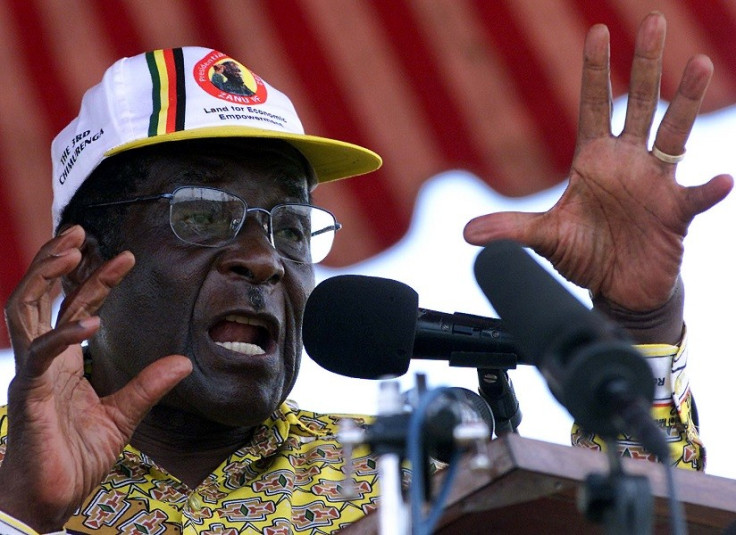Robert Mugabe's Election Fiddle Darkens Zimbabwe's Future Further [BLOG]
Electoral tampering by Zanu PF paints even bleaker outlook for troubled Zimbabe, argues Daniel Molokele

It would not be a Zimbabwean electoral process if it just came and went without any acrimonym now would it?
And so it happened that, just like controversial polls before it, the much anticipated 2013 general election brewed up another big shock. This one is being viewed by many observers as the most cunning of them all.
Zanu PF's Robert Mugabe has been known since time immemorial as an ingenious electoral engineer but this time he might have even outdone himself. The 2013 election results are his most brilliant electoral masterstroke to date, and will go down in the annals of Zimbabwe's political history as his ultimate coup de grace.
In the run-up to the elections, one of the most frequently asked questions centred on Mugabe's return to his old sense of bravado and camaraderie. Even though it was a well-known fact that he had long lost his moral influence and political credibility among the Zimbabwean electorate, Mugabe was curiously keen for the polls to happen sooner rather than later. Many were puzzled and wondered aloud as to why he was brimming with so much confidence this time around.
Alas, unbeknown to his long-standing rival and hitherto coalition partner, Morgan Tsvangirai, Mugabe had invested the five years of their so-called all-inclusive government in conjuring electoral magic. By the time election day dawned, Mugabe already knew that he had an ace up his sleeve that would guarantee him a crushing victory over Tsvangirai.
To all practical intents and purposes for wily old Mugabe, the 2013 elections were by no means a popularity contest. He already knew that he was no match for the much more popular former labour leader Tsvangirai. Instead he focused on tampering with the outcome of the electoral process and the manner in which the results were announced. Therein lay his trump card.
I was in Harare when the results were being broadcast to the nation and I can fully confirm that everyone was shocked by the so-called landslide. Neither the supporters of Tsvangirai's MDC, nor Zanu PF, knew how to react. Curiously, despite the results showing that Mugabe had garnered an astonishing two million votes in less than 24 hours, there was not one bit of public celebration.
Zimbabweans fear for the future
Everyday life across Zimbabwe remained normal as if nothing had happened. The truth is that most Zimbabweans feared for their future. The word on the street was that Mugabe's prolonged stay in power was not good for the political ir socio-economic prospects of the country.
But that will not cause Mugabe any sleepless nights at all. It seems he plans to continue in active politics until his last breath. All indications are that he will try to unite his heavily factionalised Zanu PF party and also preside over his succession process. On the other hand, he will continue to close any form of open democratic space against all his political rivals and the civil society voices. There are also fears of a police-led crackdown against all perceived enemies of the state in the next few months ahead.
Zimbabweans are a peace-loving people and have even been accused of being docile. Mugabe has gambled on the fact that it is highly unlikely that his stranglehold on power will ever be challenged through mass street protests.
Zimbabweans have tried this before and failed dismally. They have even failed to stage boycott actions such as the stay-aways. The few opponents who dare to express their disapproval on the streets will be rounded up and charged with treason. Nothing else will then happen afterwards.
Zimbabwe is stuck with Mugabe for life. Even worse, Zimbabwe may be stuck with Zanu PF for a long time if the party manages to successfully resolve the thorny matter of Mugabe's successor. Buoyed by this hollow victory, Zanu PF will now confidently go ahead with its destructive populist policy of indigenisation and continue to destroy whatever little is left of the economy.
Most Zimbabweans will bury their heads in the sand and continue to try to make ends meet with or without the support of their government and state. Others will give up on the hard life in the country and reluctantly seek greener pastures outside Zimbabwe.
They will inevitably join the ever-growing numbers of the diaspora that is estimated at three million people. This is a huge figure when one considers that the 2011 census put the national population at around 13 million. To make matters worse for Zimbabwe, most of the people in exile have a lot of skills and work experience. This is the sort of human resource capital the country desperately needs to have any chance of reviving the economy.
Most Zimbabweans in the diaspora are unlikely to return to the country anytime soon. If anything, it now appears that some of them have given up on their hopes of ever returning.
Given these dark realities, it seems as if things will have to get worse first before they become better for Zimbabwe - that is if they will ever become better.
Daniel Molokele is a Zimbabwean pro-democracy human rights lawyer and international coordinator for the Global Zimbabwe Forum (GZF), a network for all organisations representing Zimbabweans living outside the country
© Copyright IBTimes 2025. All rights reserved.





















